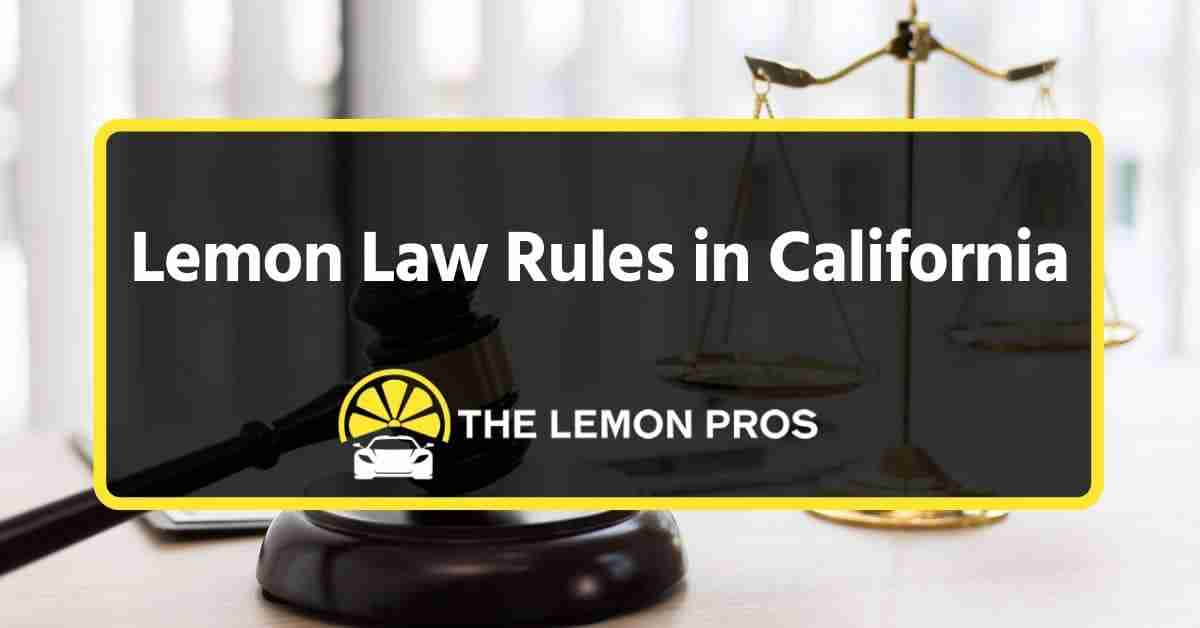
How Can I Return a Car to the Dealership?
If you need to return a car to the dealership, it’s crucial that you understand the entire process and what’s involved. Whether you are returning a new car because of defects that can’t be repaired or you are taking back a used car because of deceptive business practices, there are still going to be some obligations on your end to fulfill.
To return new or used cars, you need to review your purchase agreement, warranty paperwork, and other documentation to see what’s included. Then, you would need to make arrangements with the dealership for the voluntary repossession and either receive a refund or terminate the auto loan agreement. By working with a qualified lawyer, the process is easier and less stressful.
The Lemon Pros have handled thousands of cases just like yours. Our practice area is focused solely on Lemon laws and defective vehicles, so we have become experts in the field. Call today for a free case evaluation with our California Lemon Law attorneys.
With this comprehensive guide, you’ll learn what to do if a car purchase goes wrong and you need to return the vehicle. We also cover the process of returning motor vehicles to the dealership and the relevant laws involved.
Table Of Contents
- When Can You Return a Car to the Dealership?
- How Can I Return a Car to the Dealership?
- Your Legal Rights When Returning a Car
- What to Expect During the Return Process
- Alternatives to Returning a Car
- Need a Lemon Law Attorney?
- FAQ
- Do All Dealerships Accept Car Returns?
- Can I Return a Car After Driving It Off the Lot?
- How Many Days After You Buy a Car Can You Return It in California?
- How Long Does Returning a Car Take?
- Can I Return a Car to the Dealership if It Has Problems?
- Can You Return a Financed Car to the Dealer After 6 Months?
- Can I Return a Used Car to the Dealership?
When Can You Return a Car to the Dealership?

There are several instances when you can return a car and sue the dealership. For example, you may be able to take the car back when the vehicle falls under Lemon laws, was sold through deception, or you have a contract cancellation option. Let’s dive into these a little deeper.
- Lemon laws for defective vehicles - If a warranty covers your new or used vehicle and has unrepairable defects, you may be eligible for a Lemon Law buyback or replacement vehicle. You can use our Lemon Law buyback calculator to estimate the amount you may be eligible to receive when returning the car to the dealership.
- Fraud or misrepresentation - You have the right to return a car if you discover that there has been misrepresentation during the sale, such as odometer rollback or undisclosed damage. In these cases, you may be due any damages plus additional compensation for the trouble.
- Contract cancellation option agreement - If there’s a provision in the contract that allows you to return a car, you can take it back to the dealership, but there may be additional fees involved.
Is There a Cooling-off Rule or Grace Period for Car Purchases in California?
Sadly, car sales in California are considered final, with no automatic right to return the car if you change your mind or have buyer’s remorse unless there is a stipulation in the dealership’s policies. However, you can purchase a contract cancellation option from some dealerships that gives you the right to return some vehicles within two days. It’s best to ask the dealership for its specific guidelines before purchasing a car.
How Can I Return a Car to the Dealership?
While there are valid reasons to return a car to the dealership, the process isn’t as simple as just taking the vehicle back. Here, we’ll cover some of the steps related to returning a new vehicle.
1. Review Your Purchase Agreement
It’s important to educate yourself before taking any action. Read through the stipulations, as some car dealers may include a return period that comes with restocking fees and other associated costs. Additionally, you must continue making payments until everything is worked out and you’ve signed on the dotted line to return the car. Otherwise, your car could be repossessed, and you could end up with nothing but a bad credit score.
2. Contact the Dealership

The next step is to contact the car dealership and inquire about the process for returning the vehicle. You must remain polite and professional to the staff if you hope to progress. However, you don’t need to be a complete pushover. You may also consider asking to speak with the sales manager, as the typical salesperson isn’t going to be able to make decisions. In most cases, the car dealerships aren’t going to take your car back voluntarily, so you may need to continue through the process.
3. Provide Necessary Documentation
It’s essential to have all your ducks in a row if you want to return a new or used car. You will want your purchase or lease agreement, the car title, and any relevant financing details. There should also be documentation of the problems you are facing or evidence related to why you want to return the vehicle.
4. Negotiate the Return
Be willing to negotiate with the dealership if they want to work with you. If they don’t, you may need to get a Lemon Law lawyer involved, especially if there are consistent mechanical issues. We have experience building a solid case against the dealership and manufacturer, ensuring our clients can return their vehicles. Contact our experienced Lemon Law attorney today.
5. Finalize the Return
Just as there are logistics involved in car sales, the same is true when you return a vehicle. There will be inspections to ensure the car remains in the same condition, and you may incur some additional fees. Regardless of the outcome, ensure that all details are documented in writing to prevent any future disputes.
Your Legal Rights When Returning a Car
Numerous state and federal laws are protecting your purchase. For example, the Federal Trade Commission Act, run by the Federal Trade Commission, ensures that dealerships avoid deceptive business practices, while the Magnuson-Moss Warranty Act has regulations regarding warranties on consumer products.
From the state viewpoint, California has some of the best protections in place, enforced by the state attorney general’s office. Between the Song Beverly Consumer Warranty Act to the Tanner Consumer Protection Act, you have a lot of options if you are driving a defective vehicle that’s under warranty in the state. In fact, you may be due cash compensation or a replacement vehicle if there are unrepairable defects.
Still, there are limits to the types of cars that can be returned to the dealership, especially if there are no specified rules in the contract. That’s why it’s valuable to have a Lemon Law attorney to speak to.
Returning New Cars vs. Used Cars

There are some key differences between returning a new car and a pre-owned vehicle.
- Returning new cars under California law
Most of what we’ve previously discussed was focused on the new vehicle purchase or lease. There are many additional protections available on these cars due to the warranty coverage.
- Returning used cars under California law
Sadly, there are not many options for buyers of used cars. First, Lemon laws only apply if you purchase the vehicle from a dealership and the car has a warranty. A deal with a private seller isn’t eligible, and all vehicles are sold as-is. Additionally, all used cars must have extended warranties included if there’s any hope for Lemon Law protection. There may still be options available if the dealership was deceptive or failed to disclose valuable information before you purchased the car.
What to Expect During the Return Process
Upon arrival at the dealership, you may be presented with several options. The dealership may be willing to refund the purchase price minus a deduction for the amount of use. You may receive some of the money back for the monthly payment on the auto loans. Otherwise, you could be offered a replacement vehicle of equal value. There’s also the chance that the dealership will ask to try fixing it again.
Either way, you must figure out how the return affects your financial situation. If you have legal fees, a monthly payment, or a lease agreement to consider, get everything in writing and cover all your bases.
Alternatives to Returning a Car
You don’t have to be stuck with the car if the dealership won’t take it back. Start by filing a complaint with the Better Business Bureau (BBB) so that other potential buyers are aware of the dealership's issues. After that, consider these valid options.
Trade-In Options
The dealership may be more agreeable to take the car as a trade-in on something else. Many dealerships offer auction prices for cars that they take back so that you won't take as significant a hit.
This would also result in a new loan, and you likely wouldn’t receive a reasonable price for the car, but you would be done dealing with the problem. The dealership will need to run a new credit report through the credit bureaus and reinitiate the financing process.
If you want to have lower monthly payments or keep your expenses around the same, you could opt for a more affordable car and take a downgrade. While this may be a step down from what you are already driving, you ensure that you aren’t put in a worse financial situation.
Selling the Car Privately

Selling the car as a private party may be a better option because you can get a higher price for it. Most people use the Kelley Blue Book (KBB) to price a car, so you can easily see what you might get.
If you don’t want to do the work yourself, you can opt to sell it through consignment or online marketplaces; however, both of these avenues will incur some commission and fees, so many people view this as a last resort.
Refinancing the Auto Loan – Getting a New Car Loan
Some people make car purchases and then realize they can’t afford the payments. Since this is common, it’s possible to refinance the loan to a more reasonable amount. By adding some months to the loan or getting a lower interest rate, you can effectively reduce the monthly payment, but this means there may not be as much equity in the car when you do go to sell it, so that’s something to think about.
Need a Lemon Law Attorney?
If you are returning a car to the dealership, ensure that you have everything in writing and that you return the vehicle in the same condition it was given to you. Once you are free of that vehicle, you can find the right car with new loan terms.
Because most dealerships aren’t legally required to take your car back unless you can prove there was an issue, you may need further support from a lawyer. It’s essential to gather all your paperwork, including the sales contract, which outlines the monthly payments, registration fees, sales tax, and other applicable fees, to ensure a full refund or replacement.
The Lemon Pros will review your information and outline the necessary steps to return your vehicle. As the best Lemon Law attorneys serving California, we’ve helped secure millions in compensation for our customers. Contact us to receive a free consultation.
FAQ
Are you thinking about returning your car? Whether it’s giving you trouble or the payments aren’t working out, here are quick answers to the most common questions drivers have.
Do All Dealerships Accept Car Returns?
No, most dealers are not legally obligated to take back a vehicle after it has been sold. However, there are a few exceptions, such as when the Lemon Law applies or the dealer was deceptive.
Can I Return a Car After Driving It Off the Lot?
The only way to return a car after buying it in California is if there’s a contract cancellation option agreement already established. Otherwise, you would need to prove that the dealer was deceptive or follow through with Lemon Law claims if the vehicle is defective.
How Many Days After You Buy a Car Can You Return It in California?
As a general rule, there is no mandatory cooling-off period for a car you just bought in California. If there’s a stipulation in the purchase contract that allows for a return, then you may be legally entitled to bring it back for a few days after the sale, but fees may be involved.
How Long Does Returning a Car Take?
If the dealership and manufacturer are in agreement, it may only take a few days or weeks, especially if the terms are described in the sales contract. Otherwise, a Lemon Law claim can take several months to resolve.
Can I Return a Car to the Dealership if It Has Problems?
Yes, if it’s under warranty and has unfixable defects, you may qualify for a Lemon Law return. Keep repair records and act fast.
Can You Return a Financed Car to the Dealer After 6 Months?
Not usually. But if it’s unaffordable, you might be able to trade it in or refinance your car loan for lower payments.
Can I Return a Used Car to the Dealership?
Only if it came with a warranty or is a certified pre-owned car with defects, otherwise, returns aren’t legally required unless there was fraud.






